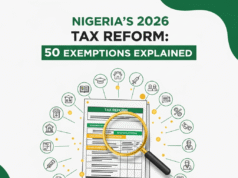+3.26%
+5.96%
+3.36%
+0.06%
-3.40%
-11.95%
Hold onto your wallets, folks! Nigeria’s tax landscape just got a major facelift with the Nigeria Tax Act 2025, and whether you’re sipping palm wine in Lagos or coffee in London, these changes are coming for you. Don’t worry though – we’re breaking down the five key ways this new tax regime affects your pocket, complete with the kind of calculations that’ll make your accountant proud (and possibly weep).
The good news? If you’re earning peanuts, Uncle Sam Nigeria is finally cutting you some slack. The bad news? If you’re rolling in naira, well… let’s just say the government wants a bigger slice of that pie. But before you start hiding money under your mattress, let’s dive into what these changes really mean for everyday Nigerians.
5 Ways The New Nigerian Tax Law Affects You
Here’s where things get interesting – and refreshingly fair. The new system introduces a progressive tax structure where individuals earning ₦800,000 or less per annum are completely exempt from personal income tax. That’s right, zero naira in taxes if you’re earning below this threshold!
For everyone else, here’s how the progressive tax brackets work:
– ₦800,001 to ₦3 million: 15% tax rate
– ₦3 million to ₦12 million: 18% tax rate
– Above ₦50 million: 25% tax rate
But here’s the twist that’ll make your head spin – it’s not a straight calculation. If you’re earning ₦1 million, you don’t pay 15% on the entire amount. Instead, your first ₦800,000 walks away tax-free, and you only pay 15% on the remaining ₦200,000. That’s just ₦30,000 in taxes instead of ₦150,000. Not too shabby!
The same graduated approach applies to higher earners. Someone making ₦5 million pays nothing on the first ₦800,000, 15% on the next ₦2.2 million, and 18% on the final ₦2 million. It’s like a tax sandwich – multiple layers, but at least the bread (your base income) is free.
Business and Personal Finances: Time to Draw the Line
Here comes the part that’ll make many Nigerian entrepreneurs uncomfortable – the days of mixing business and personal funds like a cocktail are officially over. The new law demands crystal-clear separation between your business accounts and personal accounts.
If you’ve been running that side hustle through your personal account, receiving client payments and paying suppliers from the same place your salary lands, it’s time for a serious financial makeover. The smart move? Set up a Limited Liability Company (LLC) faster than you can say “corporate compliance.”
Here’s the golden nugget: businesses with turnover below ₦50 million aren’t taxed on their revenue. Cross that threshold, and the tax man comes knocking. This creates a powerful incentive to formalize your business structure and optimize your tax position legally.
Diaspora Nigerians: The 183-Day Rule and Your Tax Obligations
For our brothers and sisters abroad, the new law introduces clearer definitions of tax residency that could either be your saving grace or your financial nightmare. The Acts establish that an individual is considered a tax resident if they spend 183 days or more in Nigeria, maintain a permanent home, or have significant economic or family ties within a tax year.
If you’re genuinely based abroad – living that expat life with less than 183 days in Nigeria and no Nigerian-sourced business income – you’re off the hook for Nigerian income tax on your foreign earnings. However, if you have investments in Nigerian mutual funds, bonds, or fixed deposits, you’ll still pay withholding tax, but that covers your tax obligations.
The plot thickens for digital nomads and remote workers. If your business generates income from Nigeria or you’re spending more than half the year back home, you’re firmly in the tax resident category and liable for tax on your worldwide income.
Perhaps the most surprising change? Every money transfer you make through banking channels now attracts VAT charges. Yes, sending money from your Access Bank account to your friend’s GTBank account will now cost you a little extra. It’s a small price individually, but collectively, it represents a significant revenue source for the government.
The bottom line? Nigeria’s new tax regime is both a carrot and a stick – rewarding lower-income earners with tax relief while ensuring high earners and businesses contribute their fair share. Whether you love it or hate it, one thing’s certain: ignorance is no longer bliss when it comes to Nigerian tax compliance.




